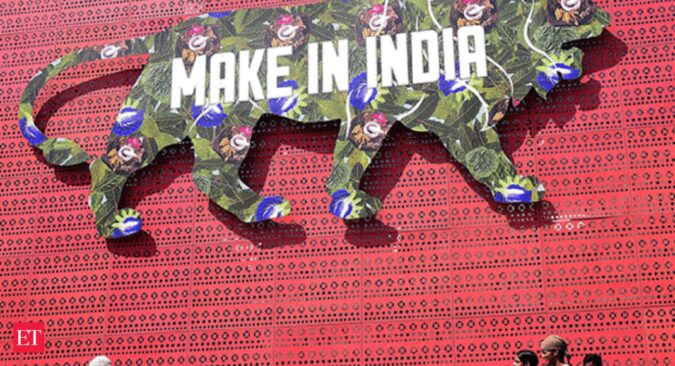The Covid-19 pandemic emboldened the companies’ realisation of the perils of depending solely on one nation for their sourcing and manufacturing operations.
With the Chinese dividend beginning to wane, India was propped up as an alternative. But Indian policymaking has long suffered from inconsistent policies, red-tapism, among other issues. And as such, companies tended to favour the likes of Thailand, Vietnam and Indonesia.
However, the Narendra Modi-led government has been tweaking norms in its bid to improve ease of doing business in India, thereby making it an attractive investment destination and a robust alternative to China.
Apple has bet big on India since it began iPhone assembly in the country in 2017, in line with the Indian government’s push for local manufacturing.
Apple’s India stores: Not an easy route
Setting up shop in India, especially for a foreign company is a tedious task even after 2014.ET in June 2016 had reported that Apple had no intentions to open its stores in India if the Central government didn’t exempt it from sourcing materials locally. The 30% sourcing commitment under the then FDI rules for single-brand retail could’ve been waived if products involved “cutting-edge” tech, but this request was denied.
In August 2019, India finally amended the rules for single-brand licence holders to include exports and contract manufacturing to be counted in the mandatory 30% local sourcing norm over a period of five years.
Apple signalled its intention to begin selling iPhones directly to Indian consumers first through its own online store after the government allowed foreign single-brand companies to sell directly via webstores, irrespective of a brick-and-mortar presence.
Plans for Apple’s physical stores were also cemented, with an expectation of 12-18 months. In October 2019, it was reported that the Cupertino-based tech giant would open its first store in India, at BKC, Mumbai.
The doors to this store and the one in Saket, in Delhi, are set to open on April 18, 2023 and April 20, 2023 respectively.
ET on Monday reported that mall executives expect around 2,000 customers to camp out overnight in anticipation of the opening of the Apple store at BKC, and the total footfalls at the store itself to be around 5,000 on the opening day.
Industry estimates put the average footfalls at the luxury mall on a weekday in the 3,000-4,000 range, meaning the Apple store opening will nearly double the traffic.
India, a credible alternative?
Assertive on having provided employment opportunities in India, Apple made the pitch to Indian authorities, seeking tweaks in FDI norms. The Centre heard the call, and made the changes, paving way for Apple’s increased presence in India.
Apple tripled its production to more than $7 billion of iPhones in India last fiscal, as it seeks to reduce its reliance on China, which is reeling from geopolitical, local and economical worries.
“India is a hugely exciting market for us and is a major focus,” Cook said during an earnings call in February. “We’re putting a lot of emphasis on the market.”
As of March 2023, Apple makes almost 7% of its iPhones in India, up from 1% in 2021.
News agency Bloomberg reported Apple might manufacture the next iPhones in India at the same time as in China. If so, that will be the first time that iPhone assembly begins concurrently in the two countries. Apple could assemble a quarter of all its iPhones in India by 2025.
Make in India: A pipe dream or just a few steps away?
By way of its flagship PLI scheme, the government has managed to attract companies such as Apple and Samsung, signalling to the other bigwigs that India may just be a credible, robust alternative over China in the long run.
Since Make in India launched in 2014, the deadline for one of the Modi government’s key goals, to lift the share of manufacturing in GDP to 25%, has been pushed back three times, from 2020 to 2022 to 2025.
Notwithstanding the success stories, there have been many companies that have quit India due to long-running challenges such as dealing with the country’s bureaucracy, including General Motors Co., Ford Motor Co. and Harley-Davidson Inc.
Incidents like past decisions on retrospective taxes that led to years of legal disputes between the Indian government and companies like Vodafone had dented India’s image as an investment destination.
Elon Musk’s Tesla Inc., which had previously said it would consider setting up a factory in India provided the country first allowed the company to sell imported cars by lowering duties, is now nearing a deal for a plant in Indonesia.
Further, renowned global companies have been hesitant to shift their bases to India, citing issues related to supply chain, infrastructure and labour.
FT in February reported that one of Apple’s suppliers had seen only a 50% yield in their production line at a casings factor. Apple prefers zero defects. Its process of expanding in India has been slow owing to issues with logistics, tariffs and infrastructure, FT added.
The road to becoming the world’s factory is riddled with hurdles. But should the government, until 2024 at least, be intent on making the atmosphere conducive for doing business in India, the prospects may be brighter than naysayers can imagine.
